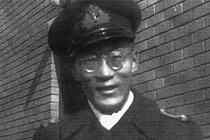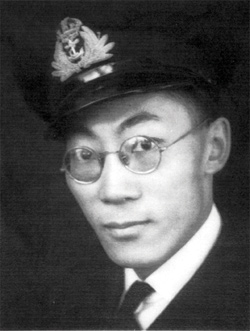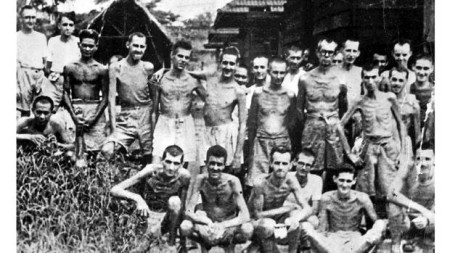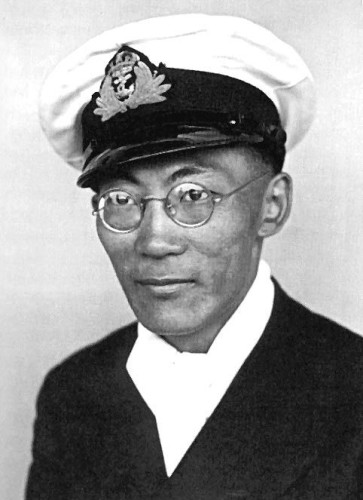
freed the Canadian POWs and liberated Hong Kong in 1945
William King Lowd Lore was a second generation Chinese Canadian: born in Victoria, British Columbia on February 28, 1909.
He was an intelligent and motivated young man who went off to McGill University in Montreal to study mining engineering. Unfortunately, his timing was off. It was 1929 and the Great Depression started to grip the country. Lore eventually was forced to leave university for financial reasons and returned to Vancouver to work for a local Chinese newspaper. Ten years later, in 1939, he became the first Chinese Canadian to enter the Canadian civil service as a Wireless Operator for the Department of Transport.
When the Second World War erupted, Lore was eager to make contribution. To his dismay, he applied for and was rejected three times when he tried to join the Royal Canadian Navy (RCN). He was turned away not for any lack of skills or qualifications, but simply because he was Chinese.
Finally, on March 1, 1943 the Navy’s policies changed. And at the personal request of Vice-Admiral Percy F. Nelles, Chief of Naval Staff, Lore once again applied and this time was accepted. Lore became the first Chinese Canadian in the RCN. He also had the distinction of being the first officer of Chinese descent in any of navies of the British Commonwealth.
Lore graduated from the Officers Training Course in June of 1943 and was at first appointed a temporary sub-lieutenant.
Lore had quite the voyage during the war. He served first in Ottawa at the Operational Intelligence Centre at Naval Service Headquarters. He moved on to London, England where he was posted with the Combined Services Radio Intelligence Unit. That led to a move to the Southeast Asia Command under Admiral Lord Louis Mountbatten. At a top secret jungle camp in Ceylon, Lore helped prepare the plans for the sea and air attack on Japanese occupied Rangoon, Burma.
Once the war the operation in Rangoon was completed, and the war in Europe declared over, Lore was next detached to the British Pacific Fleet. Then further detached to the US Navy 7th fleet, to join other officers of the 7th fleet for duty with G-2 (American Intelligence). This fleet came under the command of U.S. General Douglas McArthur’s South Pacific Command.
By August, 1945 Japan began the process of surrendering. Lore was part of the fleet that sailed into Hong Kong Harbour which had been occupied by the Japanese since 1941. He became the first officer to step ashore when he led a detachment of marines to liberate Hong Kong by taking control of HMS Tamar, the British Navy’s shore base on the waterfront.
On August 30, Lore led his troops to the Prisoner of War camp at Sham Shui Po where Canadian, British and Hong Kong prisoners had been held under atrocious conditions for several years.
The story goes that Lieutenant Lore approached the camp and ordered the Japanese guards to put their weapons down and open the gates. At first the guards laughed, but after a few minutes of discussion the gates were unlocked. Lore walked through the gates and into the barracks.
In an interview years later, Lore recalled:
“I went into the first building I came to and it was very dark. There were about 40 men in there, Canadians, sitting at tables and so forth. I said, ‘Hi you guys, don’t you want to see a Canadian?’
Then they ran forward and saw my cap badge. Those men were really skeletons. You could see their bones through the skin.
Then they were crying and weren’t ashamed of crying. And finally I cried, too because they were telling me what they had suffered.”
On September 16, 1945, Lieutenant Lore had the privilege to be present during the official handover of the colony and the surrender of the Japanese forces in Hong Kong.
Lore remained on loan to the British Navy until November 1946. He then returned to the RCN and rose to the rank of Lieutenant-Commander in the RCN. After the war, he earned a law degree at Oxford University, and set up a practice in Hong Kong. He died on September 22, 2012 at the grand age of 103 years old.


